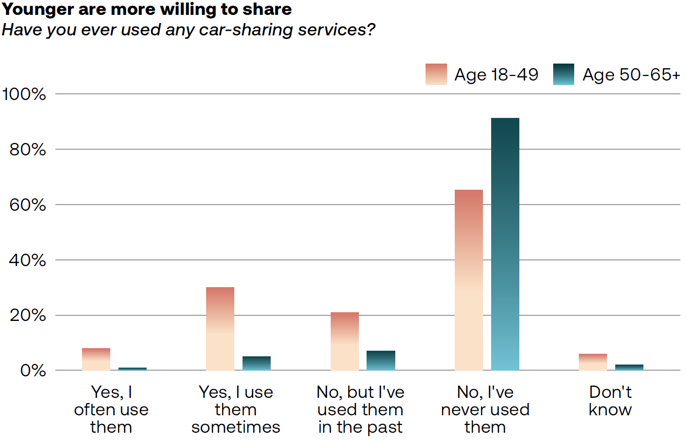The industry is moving swiftly to meet changing consumer demands and the push for sustainability. With new technologies, services, and brands, vehicle performance and the driving experience are being transformed. As both established manufacturers and startups introduce next-generation features, the transportation landscape is evolving rapidly.
We care more about where the car comes from
For instance, many new car brands have emerged over the past decade, challenging the traditional automotive landscape. These new players are diversifying vehicle types and introducing models from countries not typically associated with car manufacturing. This influx is driving innovation and expanding the industry's global reach beyond the usual hubs.
As this development continues, people in the Nordics seem to care increasingly about the origin of their cars. According to the Mobility Barometer 2024, 30 percent now say that the origin of their car is important, compared to 25 percent in 2023 when the same question was asked.
Men are more likely to consider this important (37 percent) compared to women (23), and city dwellers place higher importance on it than those in rural areas. In the Nordics, people in Finland care the most about this (36), followed by Norwegians (29), Danes (28), and Swedes (27).
Clear resistance to subscription models
The digitalization and electrification of cars have led manufacturers to offer subscription models and various add-on features. You can see this as something positive — or take a more skeptical view. The truth is, relatively few people like these subscription models. Only 13 percent of the public is overall positive about these options. However, interesting differences emerge across age groups. Those under 35 are clearly the most positive, with 24 percent supporting these models, followed by individuals between 35 and 49, where 14 percent like the idea of subscriptions. Support drops significantly to 7 percent among those between 50 and 64, and only 4 percent among those over 65.
Slowly growing interest in carsharing services?
Another common phenomenon in recent years is the rise of various car-sharing services, especially in cities and more densely populated areas. However, the idea of sharing a car with others hasn’t caught on widely with the public.
More than half of those surveyed this year, 51 percent, cannot see themselves sharing their car with others, the same proportion as in 2023. Those who find it hardest to envision sharing their car live in Finland and Denmark (53 percent), followed by individuals in Sweden and Norway (49). Those most open to sharing are in Norway and Sweden, with 22 and 21 percent respectively, followed by Denmark (21) and Finland (19).
But does this mean things will remain unchanged?
Not necessarily. There might be a slow increase in interest in car-sharing, as the number of people who can see themselves sharing their car with others has risen from 19 percent to 21 percent in one year. In cities, where most car-sharing services are located, resistance to the idea of sharing a car is significantly lower (45 percent) than in rural areas (59). At the same time, slightly more people report having used car-sharing services; 12 percent this year, compared to 10 in 2023. Additionally, slightly fewer people, 84 percent, say they have never used such a service. In last year's Mobility Barometer, this figure was 87 percent.
Professor: Key groups live in cities
Frances Sprei, Professor in Sustainable Mobility at Chalmers University of Technology, explains that the general trend is expected, as city residents with access to public transportation are prime candidates for shared mobility. They often use it for occasional trips rather than daily commutes. According to her, the success of car-sharing services heavily depends on dense urban settings: "Users often report a greater sense of community and reduced stress levels. They appreciate not just the financial savings but also the peace of mind that comes with not worrying about maintenance and parking," says Frances Sprei.







